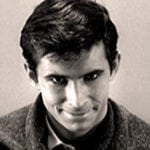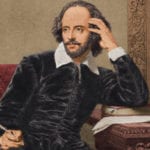 Mysteries
Mysteries  Mysteries
Mysteries  History
History 10 Surprising Stories About the Texas Rangers
 Humans
Humans 10 Philosophers Who Were Driven Mad by Their Own Theories
 Miscellaneous
Miscellaneous 10 Video-Game-Worthy Weapons and Armors from History
 Weird Stuff
Weird Stuff 10 Psychics Who Accurately Predicted Wartime Events
 The Arts
The Arts 10 Pieces of Art Inspired by a Broken Heart
 Health
Health 10 Science Fiction-Sounding New Medical Treatments
 History
History 10 Surprising Facts About the Father of Submarine Warfare
 Space
Space Ten Astonishing New Insights into Alien Worlds
 Weird Stuff
Weird Stuff 10 Bizarre Summer Solstice Rituals Still Practiced Today
 Mysteries
Mysteries Top 10 Haunting Facts About the Ghost Ship MV Alta
 History
History 10 Surprising Stories About the Texas Rangers
 Humans
Humans 10 Philosophers Who Were Driven Mad by Their Own Theories
Who's Behind Listverse?

Jamie Frater
Head Editor
Jamie founded Listverse due to an insatiable desire to share fascinating, obscure, and bizarre facts. He has been a guest speaker on numerous national radio and television stations and is a five time published author.
More About Us Miscellaneous
Miscellaneous 10 Video-Game-Worthy Weapons and Armors from History
 Weird Stuff
Weird Stuff 10 Psychics Who Accurately Predicted Wartime Events
 The Arts
The Arts 10 Pieces of Art Inspired by a Broken Heart
 Health
Health 10 Science Fiction-Sounding New Medical Treatments
 History
History 10 Surprising Facts About the Father of Submarine Warfare
 Space
Space Ten Astonishing New Insights into Alien Worlds
 Weird Stuff
Weird Stuff 10 Bizarre Summer Solstice Rituals Still Practiced Today
10 Incredible Artists Known For A Single Piece Of Work
Becoming famous in the arts is easy. All you have to do is spend decades toiling in near-total obscurity, watching as the world gives a collective “meh” to each piece you churn out, until finally you get it right and people start returning your calls.
At least, that’s the general rule. But just occasionally someone comes along with a single work so incredible—so world-changing—they need never do anything else.
10 John Kennedy Toole

For most writers, the Pulitzer Prize is an impossible dream, and they’d give their right arm just to be nominated. John Kennedy Toole won it with his first novel.
The tale of a fat and flatulent monster of a man stomping around New Orleans and raging at the modern world, A Confederacy of Dunces is one of those novels that just about everybody knows. Other writers frequently nominate it as one of the greatest novels of the 20th century. Hollywood has been trying to turn it into a film for decades. Yet when Toole killed himself at the age of 31, he thought it would never be published.
In 1969, Toole was an alcoholic mess. Hurt by the constant rejection of his novel, he became depressed and killed himself, leaving his mother to battle for 11 years to publish Dunces. Thanks to his suicide, the only other work by Toole we currently have is the Neon Bible—a manuscript he wrote at 16, later said he never wanted published, and flat-out rejected by the end of his life. His entire reputation rests on Dunces alone, and it’s a reputation that comfortably dwarfs that of most other 20th century writers.
9 Herk Harvey

Long before The Blair Witch Project made it cool, Herk Harvey was shooting micro-budget horror movies in and around his hometown in Kansas. Or at least he was trying to—of the three feature films Harvey got off the ground, he only ever completed one. The spooky ghost story, released in 1962 and completely ignored for 30-odd years, was known as Carnival of Souls.
If you’re a horror fan, there’s a very real chance you just gave a tiny cheer. Carnival of Souls is a film almost no one has a bad word about. Modern directors reference it. Respected movie magazines write essays singing its praises. George Romero once said it directly inspired Night of the Living Dead—meaning we wouldn’t have modern zombies without this under-appreciated small town thriller.
Yet it’s the only feature film Harvey ever made. His day-job as a director of training and workplace films was too grueling to allow any time off to make another, and the way Carnival flopped meant he rarely bothered trying. Instead of going on to give us a body of awesome horror films like Romero or Roger Corman, he simply went back to being a respectable Kansas businessman—an undeserved end an director with such potential.
8 The La’s

Liverpool group The La’s are the connoisseur’s choice of British rock. Twenty-four years after their debut album came out, critics continue to rave about them, and it’s not uncommon to find their hit single “There She Goes” sitting somewhere near the top of greatest songs lists. Modern music journalists credit them with ushering in the era of Britpop, meaning they basically shaped the next 20 years of UK music. In short, their influence is practically impossible to calculate, and they did it all off the back of a single album.
Released in 1990, their self-titled debut is also their self-titled breakthrough and break-up album. Driven apart by drugs and in-fighting, the band basically imploded before they could release anything else. Yet their one release was so incredible, so influential, and so well-loved that even now, this one-hit-wonder band can sell out venues on their periodic reunion tours.
That’s 24 years with no new material and very limited old material, and people still go nuts for them. By contrast, even the Rolling Stones currently have trouble shifting tickets.
7 Sappho

Unlike most artists on our list, Sappho was incredibly prolific, writing enough poetry to fill nine whole volumes of work. However, she also lived a very, very long time ago, at around 500 B.C. Over the years, most of her work was lost or crumbled away to dust. As a result, her modern reputation is now based on a single surviving poem.
As in: one. One single, solitary poem of 36-odd lines, plus a few fragments we’ve managed to uncover here and there.
Yet her reputation is no worse for it. Modern commenters frequently describe her as one of the greatest poets ever known, while her fragments of love poems about other women have seen her lionized in the gay community. From the tiny bits and pieces we have left, writers have felt comfortable suggesting her work surpasses even that of Homer, father of Western literature and author of the Odyssey.
There hasn’t been another poet before or since who could wow an audience two millennia apart with such a tiny body of work, and we’ll go out on a limb here and say there probably never will be.
6 Harper Lee

Forget J.D Salinger. The one vital mystery in American literature should be: “What happened to Harper Lee?”
The author of To Kill a Mockingbird appeared on the literary scene in 1961 with a novel so brilliant it’s frequently voted the best thing ever written. She then vanished from public life so completely that you can count all her subsequent appearances and writings on a single hand. New material by her is so rare that when she wrote a short letter to Oprah in 2006, it created a media storm. In short, Lee seems to be doing her absolute best to ensure people forget her, a quest which is completely and utterly doomed to fail.
See, not only is Mockingbird a text nearly every student on Earth has to read at some point, it’s also one of the only set texts that people honestly love. Popular polls routinely label it the most-loved book in history, with authors, academics, students, and good ol’ regular folk almost universally singing its praises. It’s spawned a classic movie adaptation and got Lee invited to the White House—not bad for a debut novel its author expected to sink without a trace.
5 Adrianus

If you thought the story of Sappho up there was unusual, wait until you get a load of Adrianus. Like plenty of ancients before him, Adrianus was a poet of the epic school, his most famous work being a long history of Alexander the Great known as The Alexandriad. We know he was a good poet because several ancient scholars go out of their way to mention him and because we can see for ourselves—sort of. Of all the great poems Adrianus presumably churned out, all we now have is a single unfinished line.
Not a chapter. Not a fragment. Just a single line.
And it’s a single line that we’re not even entirely sure he wrote. Respected classicists have previously claimed him as the author, but modern scholarship appears a little more skeptical. Assuming the older academics got it right, this tiny fragment would probably be the smallest body of existing work that a reputation has ever been hung on. It makes it impossible to judge if he was actually any good, but it sure is fascinating.
4 Inigo Jones

Unless you’re an architecture student, your first thought on reading the name “Inigo Jones” was likely: “Who?”
Allow us to explain. Jones was the first great English architect, a genius who pioneered the magnificent, stately buildings for which Britain is famous today. He single-handedly kicked off a design revolution that altered the look of an entire country and influenced countless other architects the world over. Yet we know him only by a handful of pieces, most of which were probably never even finished to his designs.
Unfortunately for posterity, Jones worked mostly in London and died in 1652, over a decade before a little something known as the Great Fire of London. The few buildings of his which didn’t perish in the conflagration were later torn down, built over, or possibly were never even constructed in the first place. Today, all we have that can be attributed to him with total certainty is the Banqueting House in Whitehall, the Queen’s House in Greenwich, and the Queen’s Chapel in central London. Of these, the Banqueting House was probably never finished as intended, and the Queen’s House was built over and later had to be restored.
That leaves a single, unimportant-looking building to mark the legacy of a man known today as one of the greatest architects who ever lived.
3 The Sex Pistols

Even if you’ve never so much as heard of this “music” thing before, you’re probably aware of the Sex Pistols. The punk band to end all punk bands, the Pistols transformed the 1970s music scene with a combination of anger, cunning PR, and a propensity for what we’d today call “trolling.” Their influence can be felt in almost all modern rock music and they were so innovative that Rolling Stone has separately named both them one of the greatest bands of all time and their debut album as one of the greatest albums of all time. And since you’ve read this far, you can probably guess where this is going: Their entire reputation rests on that one album.
Never Mind the Bollocks is the only studio album the Pistols ever cut, and it probably doesn’t have Sid Vicious on it—lead singer John Lydon once said that you “might” be able to hear him in the background of a single track. Although some members of the band later collaborated on a film, it notably failed to feature Lydon, meaning Bollocks is just about the only piece of work we now have from the punkest punk band in the whole of history.
2Charles Laughton

Charles Laughton was a huge actor in his heyday. So why, you might ask, are we including him here? Simple: Although we have plenty of examples of his acting skills, we only have one of his true talent. In 1955, Laughton directed his one and only feature film, a little picture known as Night of the Hunter.
If you’ve never heard of it before, you should know that every single film buff reading this just exploded in glee. Night of the Hunter is one of the greatest films ever made. Roger Ebert called it “beautiful”. Lesser critics have drowned themselves in hyperbole trying to describe it. Mega-influential French movie magazine Cahiers du Cinema claimed in 2008 that it was second only to Citizen Kane as the greatest film ever made.
In short, it’s one of those films that sends ordinary mortals into fits trying to describe its unearthly power . . . yet it was such a commercial flop that Laughton never wandered behind a camera again.
1George Johnson
George W. Johnson may be one of the most-important historical firsts you’ve never heard of. A New York street entertainer who made a living by whistling tunes on the sidewalk, Johnson has the distinction of being the first black artist in history to ever cut a record.
It’s hard to overstate how incredible this was. In 1890, phonograph record companies would hire white musicians to mimic popular black stage acts simply because racism was unfathomably cool back then. The idea of an African-American—a former slave, no less—landing a recording contract would have been laughed at. Yet Johnson did it, recording several hit songs that took the nation by storm.
So, given how important he was, care to hazard a guess how much George W. Johnson material we currently have?
Try about 15 minutes. Although he recorded all of his songs separately, the total work of this pioneering artist wouldn’t even fill up a quarter of an album today. Yet Johnson is undoubtedly one of the most important singers the world ever produced. He made it okay for racist white folk to like black people, and for record companies to hire people with non-white skin.
And for that he deserves to be better known. So watch the above video to hear the first song he ever recorded. It might not be palatable to today’s tastes (some of the lyrics are a tad offensive) but trust us—this guy deserves those two minutes of your time.








